- Home
- Robert Graves
Homer's Daughter
Homer's Daughter Read online
Homer’s Daughter
Robert Graves
Copyright
Homer’s Daughter
Copyright © 1955 by Robert Graves, renewed 1983 by Robert Graves
Cover art, special contents, and Electronic Edition © 2014 by RosettaBooks LLC
All rights reserved. No part of this book may be used or reproduced in any form or by any electronic or mechanical means, including information storage and retrieval systems, without permission in writing from the publisher, except by a reviewer who may quote brief passages in a review.
Cover jacket design by Carly Schnur
ISBN e-Pub edition: 9780795337437
To Selwyn Jepson, of course
CONTENTS
HISTORICAL NOTE
PROLOGUE
ONE: The Amber Necklace
TWO: The Palace
THREE: The Departure of Odysseus
FOUR: My Father’s Daughter
FIVE: Washing Day
SIX: The Naked Cretan
SEVEN: The Greedy Suitors
EIGHT: The Council Meeting
NINE: Clytoneus Sails
TEN: The Old White Sow
ELEVEN: Arrows from Halius
TWELVE: The Funeral Feast
THIRTEEN: Aethon Goes Begging
FOURTEEN: Without Flowers or Flutes
FIFTEEN: The Day of Vengeance
SIXTEEN: Homer’s Daughter
HISTORICAL NOTE
The sons of homer, a guild of travelling minstrels who claimed descent from the famous blind poet and owned a large repertory of heroic sagas, were in classical times based on the sacred island of Delos. They went from city to city throughout Greece, Asia Minor, Sicily, Italy and North Africa, enjoying protection and hospitality everywhere. Their sagas were ascribed to Homer himself, though it was an open secret that many of them were of recent composition. Since the most ancient and famous of the whole collection was the Iliad, which concerned the Siege of Troy, the Sons of Homer enlarged the Trojan cycle with new sagas explaining what had happened before and afterwards. For instance, they composed a number of tragic “Returns,” telling how the Greek survivors of the ten-year war sailed home, but were either wrecked on the voyage or driven far out of their course, and returned only to find their wives unfaithful and their thrones usurped.
The Odyssey, though invariably ascribed to Homer, was composed at least a hundred and fifty years later than the Iliad and the atmosphere is altogether different: sweeter, more humorous, more civilized. The Iliad is a poem about and for men, the Odyssey (despite its male hero) is a poem about and for women. Whoever wrote it had read the greater part of the Homeric sagas which are still extant in whole or part, except the very latest, and seems to have worked from an original Return of Odysseus. But the saga has been recast, only the prologue and a few score lines being preserved more or less as they stood. The original Odysseus, it seems, found his wife Penelope living riotously with fifty lovers, all of whom he killed on his return to Ithaca, and after sending her home to her father in disgrace, was himself accidentally transfixed with a sting-ray spear by his long-lost son Telemachus, who had landed unannounced and did not recognize him. Odysseus’s “many cities,” mentioned in the prologue, have been reduced to two and the rest replaced by ungeographical islands borrowed from an entirely different story—an allegorical myth of one Ulysses, famous for his frequent cunning evasions of death. But once the saga element and the allegorical element have been isolated, what remains of the Odyssey is intimate domestic description of Greek provincial life in the far west about the year 750 B.C. The central character is Princess Nausicaa, daughter of King Alcinous and Queen Arete of Phaeacia—another ungeographical place.
Apollodorus, the leading classical authority on Greek myths, records a tradition that the real scene of the poem was the Sicilian seaboard, and in 1896 Samuel Butler, the author of Erewhon, came independently to the same conclusion. He suggested that the poem, as we now have it, was composed at Drepanum, the modern Trapani, in Western Sicily, and that the authoress was the girl self-portrayed as Nausicaa. None of his classical contemporaries, for whom Homer was necessarily both blind and bearded, deigned to pay Butler’s theory the least attention; and since he had, as we now know, dated the poem some three hundred years too early and not explained how a Sicilian princess could have passed off her saga as Homer’s, his two books on the subject are generally dismissed as a good-humoured joke.
Nevertheless, while working on an explanatory dictionary of Greek myths, I found Butler’s arguments for a Western Sicilian setting and for a female authorship irrefutable. I could not rest until I had written this novel. It re-creates, from internal and external evidence, the circumstances which induced Nausicaa to write the Odyssey, and suggest how, as an honorary Daughter of Homer, she managed to get it included in the official canon. Here is the story of a high-spirited and religious-minded Sicilian girl who saves her father’s throne from usurpation, herself from a distasteful marriage, and her two younger brothers from butchery by boldly making things happen, instead of sitting still and hoping for the best.
PROLOGUE
When my childhood had slipped by, and the days no longer seemed eternal but had shrunk to twelve hours or less, I began to think seriously about death. It was my grandmother’s funeral procession, in which half the women of Drepanum marched, lamenting like curlews, that made me conscious of my own mortality. Soon I should marry, bear children, grow stout, old and ugly—or thin, old and ugly—and presently die. Leaving what behind? Nothing. Expecting what? Worse than nothing: everlasting half darkness, where the ghosts of my ancestors and ancestresses wander about an unfeatured plain, gibbering like bats; skilled in all the lore of past and future, yet forbidden to profit from it; still endowed with such human passions as jealousy, lust, hatred and greed, but powerless to consummate them. How long is a day when one is dead?
A few nights later my grandmother appeared to me in a vision. Three times I sprang towards her and tried to hug her, but each time she stepped aside. I was deeply hurt and asked: “Grandmother, why will you not stay still when I try to kiss you?”
“Darling,” she answered, “all mortals are like this when they are dead. Sinews no longer constrain their flesh and bones, which perish in the cruel flame of the pyre; and the soul flits away like a dream. Do not think I love you less; but I have no substance.”
Our priests assure us that certain heroes and heroines, children of the Gods, enjoy an enviable immortality in the Islands of the Blessed; a fancy which the tellers themselves do not believe. Of this I am certain: that no true life exists beyond the life we know, namely the life beneath the sun, moon and stars. The dead are dead, even though we pour libations of blood for their ghosts to drink, hoping to give them an illusion of temporary rebirth. And yet—
And yet there are the songs of Homer. Homer died two hundred years ago, or more, and we still speak of him as though he were living. We say that Homer records, not that he recorded, such and such an event. He lives far more truly even than do Agamemnon and Achilles, Ajax and Cassandra, Helen and Clytaemnestra, and the others of whom he wrote in his epic of the Trojan War. They are mere shadows, given substance by his songs; which alone retain the force of life, the power to soothe or stir or draw tears. Homer is now, and will be when all my contemporaries are dead and forgotten: I have even heard it prophesied, impiously, that he will outlast Father Zeus himself, though not the Fates.
Brooding on these things at the age of fifteen, I grew melancholy and reproached the Gods for not making me immortal; and envied Homer. This was odd, certainly, in a girl, and our housekeeper Eurycleia often shook her head at me when I mooned about the Palace with a set, downcast face, instead of enjoying myself like others of my age. I ne
ver answered her, but thought: “And you, dear Eurycleia, have nothing left in store for you but ten or twenty years at the most, during which your strength will gradually decline and your rheumatic pains increase, and then what? How long is a day when you are dead?”
This preoccupation of mine with death excuses, or at least explains, the most unusual decision I have recently taken: of securing for myself a posthumous life under the mantle of Homer. May the Blessed Gods, who see all, and whom I never neglected to honour, grant me success in this endeavour, and conceal the fraud. Phemius the bard has sworn an unbreakable oath to put my epic poem in circulation: thus paying the debt he incurred on that bloody afternoon when, at the risk of my own life, I saved him from the two-edged sword.
As for my condition and lineage: I am a princess of the Elymans, a mixed race living on and about Eryx, the great, bee-haunted mountain which dominates the westernmost corner of three-sided Sicily and takes its name from the heather upon which countless bees pasture. We Elymans pride ourselves on being the remotest nation of the civilized world; though this is, indeed, to disregard certain flourishing Greek colonies planted in Spain, and Mauretania since we first made the boast—not to mention the Phoenicians, who, though non-Greek and addicted to barbarous human sacrifice, have some claim to be called civilized, and are established at Carthage, Utica and elsewhere on the African coast. I must now give a brief account of our origins. My father claims direct male descent from the hero Aegestus. Aegestus was born in Sicily, a son of the River God Crimissus and the exiled Trojan noblewoman Aegesta, but is said to have sailed to Troy at King Priam’s request when King Agamemnon of Mycenae besieged the city. Troy, however, was fated to fall, and Aegestus had been fortunate to escape death among the Achaean spears. Roused from sleep by his kinsman Aeneas the Dardanian, as soon as the enemy, breaking into Troy, began to massacre the drowsy inhabitants, he led a party of Trojans out through the Scaean Gate and away to Abydus; Abydus being a fortress on the Hellespont where (so they say), mindful of a prophetic warning given by his mother, he kept three well-provisioned ships moored in readiness. Aeneas also escaped. Cutting his way through the Achaean forces to Mount Ida, he made preparations there for embarking his Dardanian subjects in a fleet beached at Percote, and presently followed in Aegestus’s wake.
A fresh gale carried Aegestus south-westward across the Aegean Sea, past Cythera, Aphrodite’s island; and westward across the Sicanian Sea, until he sighted Etna, the ever-burning mountain, which rises on the opposite side of Sicily from us. Here he landed and drew water for his fleet before steering south to round Cape Pelorus. Five days later, the Aegadean Islands rose into view, and he thankfully beached his ships in the landlocked bay of Rheithrum, under the shadow of Mount Eryx, where he had been born. A blue halcyon bird skimmed past the ships’ sterns, and at this sign of favour from the Goddess Thetis, who calms the sea, Aegestus burned them in her honour; but first he prudently unloaded all the cargo, cordage, sails, metal, and other objects which might be of use to him ashore. It was to commemorate this sacrifice, offered some four hundred years ago, that my parents named me Nausicaa, which means “Burning of Ships”.
No other Greek-speaking colonists had as yet settled in Western Sicily. The entire island, except for a few Cretan colonies, was then inhabited by Sicans, an Iberian race, many of whom had befriended Aegestus and his mother in their strong city of Eryx, which nestles on the mountain’s knees. Aegestus approached their King, his foster-father, with noble gifts of cauldrons, tripods, and bronze weapons fetched from Troy, interceding for the Trojan refugees; and though, being a naturally morose and self-sufficient race, the Sicans of Eryx did not disguise their suspicions, the King at last persuaded his council to let Aegestus build himself a city nearly at the top of the mountain. Aegestus named it Hypereia, or “Upper Town”; and bought from the Sicans a large stock of sheep, goats, cattle and hogs. Soon Aeneas arrived with six more ships, on his way to Latium, and proved his friendship by helping Aegestus to complete the city walls. He also founded the Temple of Aphrodite on the summit—an erotic institution in favour of which I have little to say; though Aeneas’s act was a pious one, Aphrodite being his mother. At first the people of Hypereia lived on neighbourly terms with those of Eryx, who showed them all the riches of the mountain and, in return, were taught the finer mysteries of smithcraft and carpentry, besides the art of harpooning tunny and swordfish from a platform set halfway up the ship’s mast. The two nations being united in their devotion to the Sican Mountain Goddess Elyme—whom our people identified with Aphrodite, though she bore a far closer resemblance to the Goddess Alphito of Arcadia—we are now known as Elymans.
Some seven generations later, another element, the Phocaean, was added to the Elyman nation thus formed; and by then the proud Achaean cities of the Peloponnese, in which the destruction of Troy had been planned, lay ruined. Barbarous Dorians, the so-called Sons of Hercules, wielding iron weapons, and with iron hearts, had swept through the Isthmus of Corinth, burned citadel after citadel, and driven the Achaeans from their rich pastures and cornfields into the mountainous regions of the North; there they still survive, dwindled and inglorious. The elder inhabitants of Greece, however—Pelasgians, Ionians and Aeolians—as many as loved liberty and possessed ships, hastily gathered together their treasures and set sail to find new homes overseas, especially on the coast of Asia Minor, where they had often before gone trading. Among these emigrants were Phocians from Mount Parnassus, descendants of Philoctetes the archer, whose arrows accounted for Prince Paris at Troy; but two Athenian noblemen led them. Their new city of Phocaea, built on the mainland behind Chios, became famous for its fifty-oared merchant-galleys which ventured across the length and breadth of the Mediterranean: as far westward as the Pillars of Hercules, and as far northward as the mouth of the Po. Geryon, King of Tartessus in Southern Spain, having taken a liking to certain honest Phocaean traders, invited these to settle in his country, and promised to build them a city. They agreed with joy, and sailed home to fetch their wives, children, household goods and sacred images; expecting to find the city walls already raised to receive them when they landed in the following summer.
Yet the Blessed Gods disposed otherwise. The colonists sailing in convoy, their prows wreathed in myrtle, were blown off course by a north-easterly gale and cast ashore among the lotus-eating Nasamonians of Libya. Though they saved five of their seven ships, these proved so unseaworthy that, taking advantage of a brisk south wind, they steered for Sicily, the nearest land where it would be possible to refit. Mount Eryx was reached in safety, with every hold deep in water, and they beached the flotilla at Rheithrum, not having lost a man, though their provisions were spoilt. Believing that the God Poseidon had designed them to settle hereabouts rather than in Tartessus—the myrtle on their prows forbade their return—they came as suppliants to the King of Hypereia, who magnanimously forgave them the wrongs which their ancestors had done to the Trojans. It is said, nevertheless, that the captain and crew of one ship attempted to sail back to Asia Minor, but they had gone no farther than a mile and a half before Poseidon transformed the ship into a rock; and there she still rides for all the world to see. They call her the “Rock of Evil Counsel”, and also add that Poseidon threatened to topple down the summit of Eryx on the heads of any other would-be deserters.
Now, the Hypereians had built a hamlet on the northern foothills of Eryx and named it Aegesta, after their ancestress; as they also named its two streams Simoïs and Scamander, after the Trojan rivers mentioned by Homer. Here, with the permission of the King of Eryx, they had set up a hero shrine for the ghost of Anchises the Dardanian, Aeneas’s father, who was said to have died during the building of Hypereia. The Phocaeans using Sican labour and adopting the Sican style, soon enlarged this village to a city, over which a prince of Hypereia was appointed to rule. But the wild Sicans, resentful of this new encroachment on their grazing and hunting grounds, did not hesitate to ambush and kill the newcomers; and Eurymedon, the Sican Kin
g of Eryx, refused to intervene, declaring that he had never consented to the Phocaean occupation of Aegesta. He even lent his compatriots secret help; and this naturally precipitated a quarrel between the cities of Eryx and Hypereia. Armed clashes led to a full-scale war, in which Eurymedon was soundly defeated. The Hypereians seized Eryx, proclaiming their own King “Father of the Elyman League”—Eryx, Hypereia, and Aegesta—and ordered the city councils to foster intermarriage between the three races. Our blood is therefore mixed, yet our ruling tongue is Ionian Greek, touched a little with Aeolian; and though remotely placed, we are far better people in every way than the Dorians of the Peloponnese, who camp sluttishly among the blackened ruins of the beautiful cities celebrated in Homer’s songs.
This land of ours is good and its seas full of fish—especially tunny, the firm flesh of which has always been our staple food; but if we are entitled to one complaint, it is that the greater part of the Sican nation has obstinately refused to join our Elyman League. The Sicans are wild, tall, sturdy, uncouth, tattooed, unhospitable, prolific folk, who respect neither travellers nor suppliants, and live like beasts in mountain caves, each family apart, with its flocks. They acknowledge no king, and no deity except the Goddess Elyme, worshipped as a fertile, prescient sow, and no law but their own inclination; moreover, they brew no liquor, use neither iron nor bronze weapons, never venture out to sea, keep no markets, and will not even shrink at certain seasons from the taste of human flesh. With these abominable savages—I am ashamed to call them our cousins—we are neither at peace nor at war; wise travellers, however, pass through their land only in well-armed companies, sending hounds ahead to raise the alarm should an ambush have been laid in any forest or narrow defile.
At least we had the good fortune to live out of the way of the Sicel invasion, which took place shortly before the arrival of the Phocaeans. The Sicels are Illyrians, of an entirely different stock from the Sicans, who crossed the Strait of Messina on rafts and, being busy and numerous, soon possessed themselves of Central and Southern Sicily, swallowing up the settlements planted there by Cretans and Achaeans. But all war bands exploring in our direction were driven off with heavy loss—they are not so sturdily built as the Sicans, nor such formidable fighters—and ever since, by tacit agreement, the Sicels have kept within their own boundaries, leaving us alone. Their commerce is mainly with the Greeks of Euboea and Corinth. A few small Phoenician trading posts on promontories or small islands off the north coast have caused us no trouble so far; for, as my father says, “Trade begets trade.” And now Greek colonies are being planted to the east of us, and on the toe of Italy; which pleases us well.

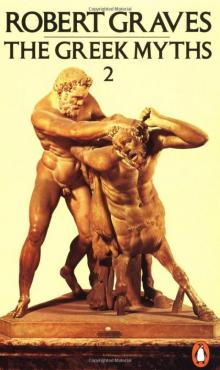 The Greek Myths, Volume2
The Greek Myths, Volume2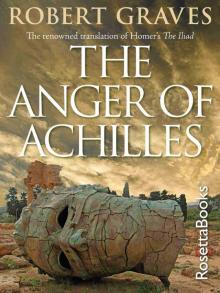 The Anger of Achilles: Homer's Iliad
The Anger of Achilles: Homer's Iliad Count Belisarius
Count Belisarius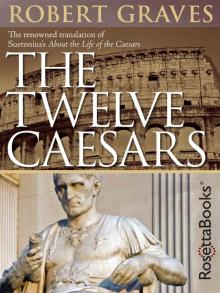 The Twelve Caesars
The Twelve Caesars Complete Poems 3 (Robert Graves Programme)
Complete Poems 3 (Robert Graves Programme) Homer's Daughter
Homer's Daughter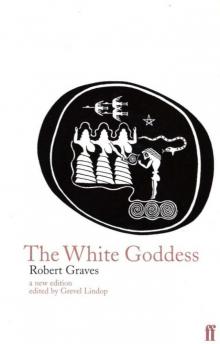 The White Goddess
The White Goddess Goodbye to All That
Goodbye to All That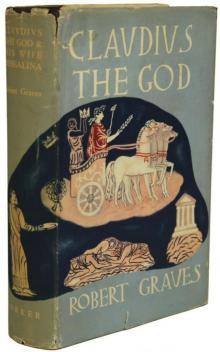 Claudius the God and His Wife Messalina
Claudius the God and His Wife Messalina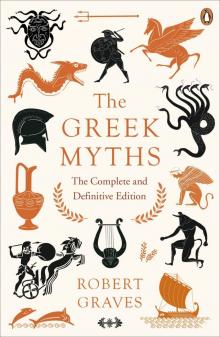 The Greek Myths
The Greek Myths I, Claudius
I, Claudius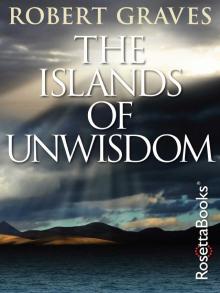 The Islands of Unwisdom
The Islands of Unwisdom Complete Short Stories
Complete Short Stories The Golden Fleece
The Golden Fleece They Hanged My Saintly Billy
They Hanged My Saintly Billy King Jesus
King Jesus Sergeant Lamb's America
Sergeant Lamb's America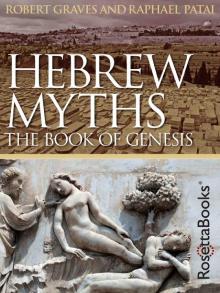 Hebrew Myths: The Book of Genesis
Hebrew Myths: The Book of Genesis Seven Days in New Crete
Seven Days in New Crete Proceed, Sergeant Lamb
Proceed, Sergeant Lamb Claudius the God
Claudius the God Wife to Mr. Milton
Wife to Mr. Milton The Complete Poems
The Complete Poems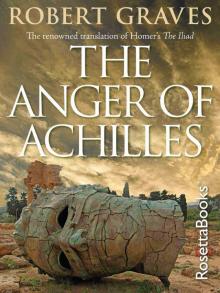 The Anger of Achilles
The Anger of Achilles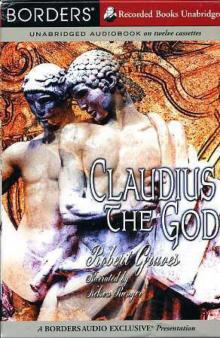 Claudius the God c-2
Claudius the God c-2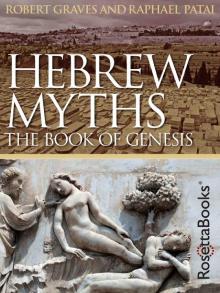 Hebrew Myths
Hebrew Myths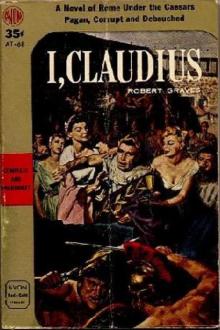 I, Claudius c-1
I, Claudius c-1 The Greek Myths, Volume 1
The Greek Myths, Volume 1